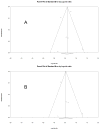The association between metabolic syndrome and hepatocellular carcinoma: systemic review and meta-analysis
- PMID: 24402120
- PMCID: PMC3887366
- DOI: 10.1097/MCG.0b013e3182a030c4
The association between metabolic syndrome and hepatocellular carcinoma: systemic review and meta-analysis
Abstract
Background: The metabolic syndrome (MetS) and/or its individual components have been linked to the development of cancer. Recent studies have suggested a similar link to hepatocellular carcinoma (HCC). The aim of this study was to evaluate the direction and magnitude of the association between the MetS and HCC.
Methods: Two reviewers independently conducted a systemic search to identify the available evidence from databases from January 1980 to June 2012. Search terms included "Metabolic syndrome," "insulin resistance syndrome," "metabolic abnormalities" combined with "hepatocellular carcinoma," and "liver cancer." No language restriction was applied to the search. Only studies reporting an effect measure for the association between MetS and HCC were eligible for inclusion. Publication bias was assessed using the Begg and Egger tests, with a visual inspection of funnel plot. All analyses were performed using Comprehensive Meta-analysis version 2 software.
Results: Four studies (3 cohort and 1 case control) with a total of 829,651 participants were included in the analysis. The age range of participants was between 30 and 84 years. The combined analysis showed an overall 81% increased risk of HCC in cases with MetS (relative risk, 1.81; 95% confidence interval, 1.37-2.41). After excluding the single case-control study from analysis, the overall risk ratio remained statistically significant (relative risk, 1.49; 95% confidence interval, 1.27-1.74). Funnel plot inspection, Begg and Egger tests showed no evidence of publication bias for combined analysis.
Conclusions: Though studies are scarce, currently available epidemiologic data are suggestive of significantly higher risk of HCC among patients with MetS.
Conflict of interest statement
Figures
Comment in
-
The association between metabolic syndrome and hepatocellular carcinoma: a missed meta-analysis.J Clin Gastroenterol. 2014 Sep;48(8):742-3. doi: 10.1097/MCG.0000000000000097. J Clin Gastroenterol. 2014. PMID: 24618507 No abstract available.
References
-
- El-Serag HB. Hepatocellular carcinoma. N Engl J Med. 2011;365(12):1118–27. Epub 2011/10/14. - PubMed
-
- Third Report of the National Cholesterol Education Program (NCEP) Expert Panel on Detection. Evaluation, and Treatment of High Blood Cholesterol in Adults (Adult Treatment Panel III) final report. Circulation. 2002;106(25):3143–421. Epub 2002/12/18. - PubMed
-
- Lakka HM, Laaksonen DE, Lakka TA, et al. The metabolic syndrome and total and cardiovascular disease mortality in middle-aged men. JAMA. 2002;288(21):2709–16. Epub 2002/12/04. - PubMed
Publication types
MeSH terms
Grants and funding
LinkOut - more resources
Full Text Sources
Other Literature Sources
Medical




